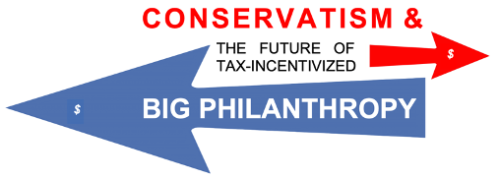Follow the money.
Part of The Giving Review’s online symposium, “Conservatism and the Future of Tax-Incentivized Big Philanthropy.”
Why is there no economic conservatism in America? So-called conservative philanthropy should be assigned much of the blame, for crowding out genuine conservative economic thought and replacing it with radical libertarian ideology.
In most western democracies since 1945, conservatives like British One Nation Tories and French Gaullists have rejected free-market libertarianism in favor of a limited, but powerful non-leftist national government. In Germany, the conservative Christian Democrats and the libertarian Free Democrats have been separate parties. But in the United States, even as they have disagreed with libertarians on abortion, drugs, and foreign policy, conservative Republicans have adopted more or less the entire economic platform of the Libertarian Party.
The Libertarian Party is extremely unpopular with American voters, winning at best a few percentage points of votes cast in some elections. Why have the establishment conservative movement and the Republican Party embraced the platform of an unpopular fringe party as its own? Why do conservatives seek guidance in economic policy from thinkers like Ayn Rand, Milton Friedman, Ludwig von Mises, and Friedrich Hayek, all of whom contemptuously rejected the label “conservative” for themselves and insisted they were “liberals” or “classical liberals”?
The usual answer of libertarian conservatives is that the United States was born liberal, and therefore conservatism in America must conserve the economic liberalism of the Founding. But neither the Founders nor any significant American leaders of either party before the late 20th Century held anything like modern libertarian economic views. In the 19th Century, the “American School of National Economy” associated with Alexander Hamilton and Henry Clay rejected “English” free trade in favor of infant-industry tariff protectionism. Ironically, it was the Confederates—who rejected the liberal idea of human equality enshrined in the Declaration of Independence—who favored free trade and small, weak, ineffective government, to serve the short-term interests of their parasitic oligarchy.
In his essay “Libertarians: the Chirping Sectaries” in the Fall 1981 issue of Modern Age, Russell Kirk wrote:
So in the nature of things conservatives and libertarians can conclude no friendly pact. Conservatives have no intention of compromising with socialists; but even such an alliance, ridiculous though it would be, is more nearly conceivable than the coalition of conservatives and libertarians. …
…
It is of high importance, indeed, that American conservatives dissociate themselves altogether from the little sour remnant called libertarians.
The substitution of simple-minded libertarian dogmatism for sophisticated conservative economic thought on the modern American right is not the result of tradition, then. The solution to the mystery is right-wing philanthropy. Most of the major individual donors to the Republican Party and mainstream conservative institutions are not conservatives themselves. They are libertarians, who combine free-market libertarianism in economic views with social liberalism, like the Koch brothers and Paul Singer. The views of market fundamentalists are reflected not only in their own direct giving but also in the philanthropies they endow.
Since the 1950s and 1960s, when the libertarians of the Mont Pelerin Society succeeded in ostracizing other economic schools on the right, rich libertarians have discovered that instead of wasting money on Libertarian Party campaigns, they can pursue their goals by funding conservative think tanks and magazines and media, in addition to funding Republican candidates for office. As a result, there is no economic conservatism in the U.S., only two versions of libertarianism—the honest libertarianism of the Libertarian Party and the Cato Institute and Reason magazine, and the stealth libertarianism of the GOP and most so-called conservative think tanks and magazines. The great Peter Viereck was purged by the libertarian gatekeepers from the conservative movement for his conservative defense of trade unions and social insurance, and in the 1980s, Kevin Phillips was driven out of the mainstream right by pseudo-conservative libertarians for advocating a national industrial policy in response to East Asian mercantilism. In contrast, former Cato Institute fellows and program officers are always welcome in “conservative” think tanks and magazines.
The result is a politics of “bait-and-switch,” in which conservative voters repeatedly vote for communitarian, populist, and nationalist policies, while elected Republicans give their libertarian donors the tax cuts that they want. Fifty-six percent of Republicans support a public health-insurance option, according to a Morning Consult poll in 2021. In 2020, a Kaiser Family Foundation poll found that the chief concern of Republican voters was excessive health-care costs (24%), dwarfing opposition to single-payer (19%) and opposition to Obamacare (3%). Indeed, according to the same poll, 25% of all Republicans, and one-third of young Republicans, favored a single government-run health-care system, while only 12% wanted to eliminate Medicare and Medicaid in favor of private alternatives. Ignoring the preferences of their own constituents, and reflecting the radical anti-statism of their libertarian donors, Republican politicians have no consensus plan to help Republican voters struggling with health-care costs, and no health-care agenda at all ever since the Republican Congress under Trump failed to repeal the Affordable Care Act (Obamacare).
The gap between Republican voter preferences and libertarian Republican policies is just as wide when it comes to views of organized labor. In 2020, union members who were Republicans or leaned Republican (43%) were almost as numerous as Democrats and Democratic leaners (49%), while union members who called themselves “strong Republicans” (31%) outnumbered “strong Democrats” (29%). According to the same poll, union members are more likely to have positive views of capitalism than the general public. Nevertheless, most Republican elected officials treat even private organized labor as an enemy within to be completely annihilated. Even the fake populist Donald Trump stacked the National Labor Relations board with anti-union corporate lobbyists.
“Three-Quarters of Republicans Oppose Raising Minimum Wage: Poll” was a headline in the conservative magazine Newsweek in 2021. The headline was false and deceptive; according to the story itself, 56% of Republican respondents favored raising the minimum wage from its present level of $7.25 an hour to $11 an hour, though not to $15 an hour. Although Senators Mitt Romney and Tom Cotton have proposed a $10 minimum wage, most Republicans oppose any increase. Why? Because according to radical libertarian ideology, all minimum wages are illegitimate, and “freedom” requires allowing employers to pay workers 25 cents an hour if the workers are desperate enough.
Nowhere is the gap between what Republican voters want and what pseudo-conservative libertarian Republican politicians deliver than in the case of Social Security. In a 1954 letter to his brother, Republican President Dwight Eisenhower warned that
Should any political party attempt to abolish social security, unemployment insurance, and eliminate labor laws and farm programs, you would not hear of that party again in our political history. There is a tiny splinter group, of course, that believes you can do these things. Among them are H. L. Hunt (you possibly know his background), a few other Texas oil millionaires, and an occasional politician or business man from other areas. Their number is negligible and they are stupid.
Despite their negligible numbers and their stupidity, libertarian zealots, bankrolled by rich donors and right-wing foundations, have spent the seven decades since Eisenhower wrote that letter trying to abolish Social Security and replace it with tax-favored private savings accounts. Since the 1970s, right-wing donors have showered money on think-tank programs with advocates of total or partial Social Security privatization like Peter Ferrara, Stuart Butler, and Andrew Biggs.
The campaign against Social Security reflects libertarian ideology, not merely the selfish interest of Wall Street mutual funds in skimming fees from hundreds of millions of possible new mutual-fund accounts. Only sincere libertarian dogmatism can explain why George W. Bush made partial privatization of Social Security part of his second-term agenda, triggering a backlash from Republican voters themselves. Only authentic free-market radicalism can explain Senator Rick Scott’s recent proposal to terminate Social Security and Medicaid every year and force Congress to renew them annually.
In June 2022, Republican Senate candidate Blake Masters declared: “Maybe we should privatize Social Security, right? Private retirement accounts, get the government out of it, past a certain point, because the government, it is just too big.” Masters went down to a humiliating defeat, which contributed to the recapture of the U.S. Senate by the Democrats in a mid-term election in which the Republican Party should have done well.
In the last few years, institutions like American Compass and American Affairs have provided voice to conservatives and Republicans who reject the death-grip of libertarian economics on the conservative movement and the Republican Party. But it seems likely that those dissident voices will continue to be drowned out by the well-funded zombie libertarianism of the economic programs at legacy conservative think tanks and media like The Heritage Foundation and the American Enterprise Institute and National Review. Unfortunately, there appear to be no genuine conservative philanthropists with vast personal fortunes, only rich devotees of Milton Friedman and Ayn Rand. And at this point, there appear to be no major conservative foundations willing to fund challenges to the free-market right.
Perhaps someday, wealthy communitarian conservative philanthropists who do not seek to repeal the New Deal, crush organized labor, eliminate the minimum wage and Social Security and Medicare, and create a free-market, open-borders global economy may appear. Until then, genuine conservatives in the U.S. should minimize their reliance on conservative, or rather libertarian, philanthropy. The Republican Party should create its own in-house legislative and executive policy shops, paid for as part of government, that formulate policies reflecting the interests and values of Republican voters instead of Republican donors. Meanwhile, genuine conservative think tanks and journals should reject libertarian money and find other methods like small donations and subscriptions to fund their operations. Otherwise, Americans who vote for conservatism will continue to be served warmed-over libertarianism instead.




